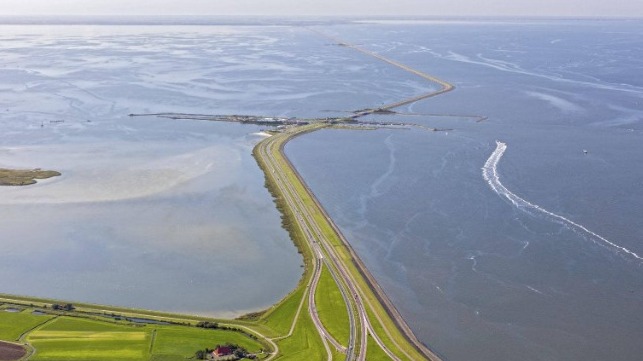UK Developer Proposes Container Port and Tidal Power Megaproject

A UK-based developer is planning to build a container terminal powered by tidal energy, a world first. The 1.5-4 million TEU terminal would be located at the entrance to The Wash, a large bay on England's central North Sea coast. It would be built in the middle of a flood-defense seawall, or tidal barrage, which would span the bay's entire 11-mile-wide entrance. The barrier would incorporate 15 tidal power turbines capabile of generating enough energy for 600,000 homes.
Developer Centre Port Holdings has partnered with leading UK energy company Centrica to study the feasibility of the tidal-power element of the plan. Centrica has invested in a seed round to help underwrite the cost of the studies, and it would provide a guaranteed price for the energy generated by the project. Some of the off-peak power could be diverted for use in making green hydrogen.
The project would create 1,000 jobs during construction, according to Centre Port, and would create employment opportunity in manufacturing, maritime transport, port operations and other supporting industries. The tidal barrage would also protect about one million people around the periphery of the bay from flooding, which has always been a threat in the area and will only become more of a problem as climate change progresses.
The container terminal would have a rail facility linking up with a nearby rail line, which would carry up to 40 percent of the container traffic. A road built atop the tidal barrage would connect to the terminal and speed up the highway connection between the cities of Lincolnshire and Norfolk, which are currently linked by a single, often-congested highway. The developer's hope is to have the project up and running by 2028.
"Centre Port provides multiple business opportunities and a lower/zero carbon operation across the import/export chain, whilst also being 50 percent nearer the East and West Midlands it serves," said CEO James Sutcliffe, a ports industry veteran who led the DCT Gdansk project in Poland. "Our mission is to retain the Wash boundaries, its wild life and ecology and to minimize climate change impacts that could devastate these sensitive areas."
However, several environmental groups are not convinced that the project is a good idea, since it would create a barrier between the bay and the sea. An NGO coalition including top UK wildlife charity RSPB and the Norfolk Wildlife Trust described the barrage as a potential threat to the health of the estuary's ecosystem.
"The Wash is the UK’s most important estuary for wild birds, home to England’s largest common seal colony, and an important fishery," RSPB and its partners said. "A tidal barrage would fundamentally alter the nature of the intertidal habitats on which this wildlife depends."
